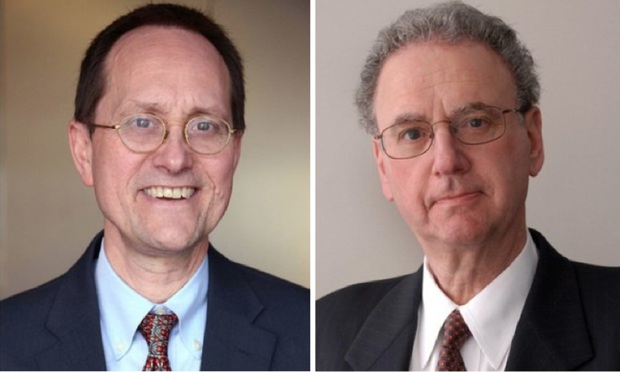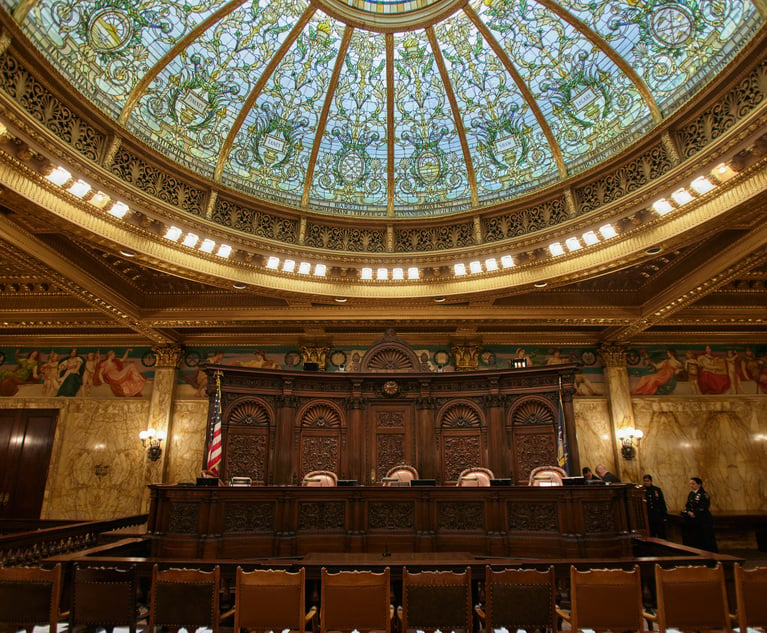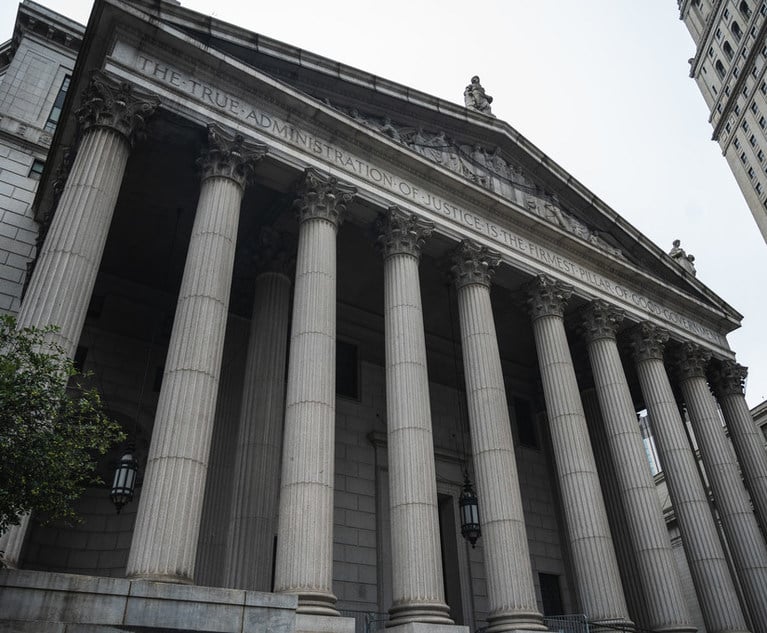Copyright Termination Rights and Loan-Out Companies
Robert W. Clarida and Robert J. Bernstein discuss whether recording artists who transferred their rights to record labels through so called "loan-out" companies are entitled to any termination rights at all under Section 203 of the Copyright Act.
July 23, 2020 at 01:00 PM
8 minute read
 Robert W. Clarida and Robert J. Bernstein
Robert W. Clarida and Robert J. Bernstein
Among its many innovations, the 1976 Copyright Act created a statutory right to terminate transfers of copyright interests, whereby authors or their statutory heirs could recapture rights they had previously granted irrevocably to third parties, "notwithstanding any agreement to the contrary." Sanctity of contract be damned, Congress made a policy decision that individual creators of copyrightable works should be entitled to a second bite at the apple, i.e., allowed to get back rights they had previously bargained away, because the true value of their works would not generally have been apparent to either party at the time the rights were sold. This termination right was embodied in two sections of the Act, section 304 (for works created before Jan. 1, 1978) and section 203 (for works created after that date).
Section 203 is at the heart of a recent decision by Judge Lewis Kaplan of the Southern District of New York in Waite v. UMG Recordings, No. 19-cv-01091 (ECF #68, March 31, 2020). In Waite, a putative class of copyright owners, comprised of recording artists who signed contracts with predecessors of defendant UMG in the 1970s and 1980s, brought an action seeking inter alia a declaration that their termination notices to UMG under Section 203 were valid, and that UMG's rights to continue exploiting the class members' recordings therefore expired at the conclusion of the statutory period—typically 35 years after the date of the original grant. This column will discuss one particularly consequential issue that the Southern District resolved in a March 31, 2020, decision on a motion to dismiss under Rule 12(b)(6), namely, whether recording artists who transferred their rights to record labels through so called "loan-out" companies are entitled to any termination rights at all under Section 203.
As Wikipedia explains, a loan-out company:
is a form of U.S. business entity in which the creator is an "employee" whose services are loaned out by the corporate body. The creator of the corporation [is] typically the sole shareholder, and thus the corporation is used as a means to reduce their personal liability, protect their assets and exploit taxation advantages. Loan-Out corporations are especially prominent in the entertainment and professional sports industries, as the creator's services are typically performed on individual contract bases, and receive large, irregular sums of income throughout the year.
The corporate body is engaged by external third parties to fulfil services, rather than the individual directly. Consequently, it is the creator's Loan-Out Corporation that is referred to and liable in contracts to perform the services required.
https://en.wikipedia.org/wiki/Loan-Out_Corporation (footnotes omitted).
Background
Section 203 of the Act was designed to help individual creators realize more of the value of the works they create, after the initial assignee of the rights, such as a publisher or record label, has had a period of exclusivity in which to profit from its investment in what is very often a speculative project like an album or a novel. As the court in Waite summarized:
[R]ecording artists often transfer copyright ownership in their works to record labels and music publishers. Recognizing that publishers often hold more bargaining power than authors and the "impossibility of determining a work's value until it has been exploited," Congress created a termination right to provide authors with an opportunity to enjoy a greater share of their work's economic success. Authors of works created on or after January 1, 1978, may terminate transfer of a license or copyright in those works thirty-five years from the date of the grant's execution …. Termination under Section 203 is available for all works "executed by the author," other than those "made for hire." … [After termination,] any continued exploitation of that work by the grantee is an infringement on the author's copyright.
Waite, slip op. at *5 (footnotes omitted).
The plaintiffs in Waite all claimed to be statutorily entitled to invoke their Section 203 termination rights in sound recordings they had created, and transferred to UMG or its predecessors in interest. Defendant UMG raised a number of arguments against the validity of the termination notices, including that the plaintiffs' claims were barred by the statute of limitations because they were asserted more than three years after the labels repudiated the plaintiffs' ownership claims; and that the court should not grant the requested declaratory relief, as to termination notices that had not yet taken effect, because "the cloud of uncertainty would not necessarily be lifted fully."
The court dismissed the plaintiffs' request for declaratory relief, but declined to resolve the statute of limitations issue in UMG's favor, citing the "unequivocal purpose of the termination provision" to "safeguard artists against unremunerative transfers," as the legislative history of the Act stated (H.R. Rep. 94-1476, at 124). The Court further held that various alleged defects in the plaintiffs' termination notices, regarding the execution dates of the grants being terminated, were harmless and were made in good faith.
Termination and Loan-Out Companies
Judge Kaplan's solicitude for the author-friendly purpose of Section 203 reached its limits, though, in the face of the clear statutory language in that section that provides that only grants "executed by the author" may be terminated:
Only grants "executed by the author" (or the statutorily designated successor) may be terminated. Therefore, third parties to a contract and loan-out companies, which "loan" out an artist's services to employers and enter into contracts on behalf of the artist, do not have a termination right under the statute.
It is undisputed that loan-out companies executed the Waite grants and that a third party company, South Coast, executed the grant for [co-plaintiff] Ely's recordings made under his 1979 agreement. In these instances, neither Waite nor Ely was the grantor. The plain language of the statute precludes either of these plaintiffs from effectuating termination.
Plaintiffs assert that Waite and Ely can terminate their grants despite their use of third parties. They contend that Waite and Ely issued a grant to the third parties, which then transferred the rights to UMG's predecessors. The third parties are thus, like UMG's predecessors, grantees rather than grantors. The [First Amended Complaint] does not support this allegation.
Plaintiffs argue also that the loan-out company is only a tax-planning device. Even so, people cannot use a corporate structure for some purposes—e.g. taking advantage of tax benefits—and then disavow it for others. While Waite and his loan-out companies, like Heavy Waite, Inc., perhaps are distinct entities only in a formal legal sense, the statutory text is clear: termination rights exist only if the author executed the grant. The Supreme Court recently reaffirmed that courts must adhere to the text the Copyright Act, even if the Act "has not worked as Congress likely envisioned" [citing Fourth Estate Pub. Benefit Corp. v. Wall-Street.com, LLC, 139 S.Ct. 881, 892 (2019)]. The unambiguous text precludes Waite and Ely from terminating the copyrights granted by third parties. Defendant's motion to dismiss claims related to grants executed by Waite's loan-out companies or Ely's third party company is granted.
Id. at 20-21 (footnotes omitted).
Conclusion
The Waite case continues and may yet result in significant rulings on larger issues, such as the work-for-hire status of sound recordings, that the court did not address in resolving the motion to dismiss. But in foreclosing termination of transfers executed by loan-out companies, rather than individual authors themselves, Waite could appreciably narrow the universe of works subject to termination. In light of the statutory text that limits the termination right to grants "executed by the author," however, that may have been just what Congress intended.
Robert W. Clarida is a partner in the New York law firm of Reitler, Kailas & Rosenblatt LLC and the author of the treatise Copyright Law Deskbook (BNA). Robert J. Bernstein practices law in New York City in The Law Office of Robert J. Bernstein. He is a frequent author and lecturer on copyright law and litigation, an Honorary Trustee and past President of the Copyright Society of the U.S.A., formerly served as Chairman of the Copyright Law Committee of the American Intellectual Property Law Association and as a member of its Board of Directors.
This content has been archived. It is available through our partners, LexisNexis® and Bloomberg Law.
To view this content, please continue to their sites.
Not a Lexis Subscriber?
Subscribe Now
Not a Bloomberg Law Subscriber?
Subscribe Now
NOT FOR REPRINT
© 2025 ALM Global, LLC, All Rights Reserved. Request academic re-use from www.copyright.com. All other uses, submit a request to [email protected]. For more information visit Asset & Logo Licensing.
You Might Like
View All
Decision of the Day: Trial Court's Sidestep of 'Batson' Deprived Defendant of Challenge to Jury Discrimination

Decision of the Day: Commercial Division Finds Defendant Engaged in Unfair Competition Against Plaintiff

Decision of the Day: Court Rules on Judgment Motions Over Police Killing of Pet Dog While Executing Warrant

Decision of the Day: JFK to Paris Stowaway's Bail Revocation Explained
Law Firms Mentioned
Trending Stories
- 1Uber Files RICO Suit Against Plaintiff-Side Firms Alleging Fraudulent Injury Claims
- 2The Law Firm Disrupted: Scrutinizing the Elephant More Than the Mouse
- 3Inherent Diminished Value Damages Unavailable to 3rd-Party Claimants, Court Says
- 4Pa. Defense Firm Sued by Client Over Ex-Eagles Player's $43.5M Med Mal Win
- 5Losses Mount at Morris Manning, but Departing Ex-Chair Stays Bullish About His Old Firm's Future
Who Got The Work
J. Brugh Lower of Gibbons has entered an appearance for industrial equipment supplier Devco Corporation in a pending trademark infringement lawsuit. The suit, accusing the defendant of selling knock-off Graco products, was filed Dec. 18 in New Jersey District Court by Rivkin Radler on behalf of Graco Inc. and Graco Minnesota. The case, assigned to U.S. District Judge Zahid N. Quraishi, is 3:24-cv-11294, Graco Inc. et al v. Devco Corporation.
Who Got The Work
Rebecca Maller-Stein and Kent A. Yalowitz of Arnold & Porter Kaye Scholer have entered their appearances for Hanaco Venture Capital and its executives, Lior Prosor and David Frankel, in a pending securities lawsuit. The action, filed on Dec. 24 in New York Southern District Court by Zell, Aron & Co. on behalf of Goldeneye Advisors, accuses the defendants of negligently and fraudulently managing the plaintiff's $1 million investment. The case, assigned to U.S. District Judge Vernon S. Broderick, is 1:24-cv-09918, Goldeneye Advisors, LLC v. Hanaco Venture Capital, Ltd. et al.
Who Got The Work
Attorneys from A&O Shearman has stepped in as defense counsel for Toronto-Dominion Bank and other defendants in a pending securities class action. The suit, filed Dec. 11 in New York Southern District Court by Bleichmar Fonti & Auld, accuses the defendants of concealing the bank's 'pervasive' deficiencies in regards to its compliance with the Bank Secrecy Act and the quality of its anti-money laundering controls. The case, assigned to U.S. District Judge Arun Subramanian, is 1:24-cv-09445, Gonzalez v. The Toronto-Dominion Bank et al.
Who Got The Work
Crown Castle International, a Pennsylvania company providing shared communications infrastructure, has turned to Luke D. Wolf of Gordon Rees Scully Mansukhani to fend off a pending breach-of-contract lawsuit. The court action, filed Nov. 25 in Michigan Eastern District Court by Hooper Hathaway PC on behalf of The Town Residences LLC, accuses Crown Castle of failing to transfer approximately $30,000 in utility payments from T-Mobile in breach of a roof-top lease and assignment agreement. The case, assigned to U.S. District Judge Susan K. Declercq, is 2:24-cv-13131, The Town Residences LLC v. T-Mobile US, Inc. et al.
Who Got The Work
Wilfred P. Coronato and Daniel M. Schwartz of McCarter & English have stepped in as defense counsel to Electrolux Home Products Inc. in a pending product liability lawsuit. The court action, filed Nov. 26 in New York Eastern District Court by Poulos Lopiccolo PC and Nagel Rice LLP on behalf of David Stern, alleges that the defendant's refrigerators’ drawers and shelving repeatedly break and fall apart within months after purchase. The case, assigned to U.S. District Judge Joan M. Azrack, is 2:24-cv-08204, Stern v. Electrolux Home Products, Inc.
Featured Firms
Law Offices of Gary Martin Hays & Associates, P.C.
(470) 294-1674
Law Offices of Mark E. Salomone
(857) 444-6468
Smith & Hassler
(713) 739-1250






